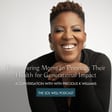
It's aPARENTly Time for Nurturing Your Mental Health: A Conversation with Hazel Walker, LMFT
In this episode, we delve into the importance of self-care and prioritizing mental health for parents. Our guest, Hazel Walker, a licensed marriage and family therapist, offers valuable insights and practical advice. We explore the complexities of modern parenthood and the importance of self-care. Learn how to reduce stress, improve your mental health, and create a more fulfilling parenting experience.
Key Takeaways:
- The challenges of balancing parenthood and self-care
- The importance of prioritizing mental health for parents
- Practical tips for self-care and stress reduction
- The benefits of seeking professional support
Guest Bio: Hazel Walker is a licensed marriage and family therapist with over a decade of experience who helps married moms prioritize themselves again so that they can stop carrying the load alone & build better partnerships with their spouse. This is done through group and 1:1 coaching. Hazel created The M.O.M Program for moms like you who have a desire to feel seen, to not carry the load alone, and to be appreciated for what they do. The program provides a holistic strategy to help prioritize YOU so you can experience more happiness and fulfillment. To schedule a discovery call and to learn more about how Hazel can support you on your journey to owning motherhood, you can head to her website www.itsaparentlytime.com
Episode Highlights:
- The impact of stress and burnout on parents
- The importance of setting boundaries and saying no
- Practical tips for self-care, such as mindfulness, exercise, and hobbies
- The benefits of seeking professional support for mental health
Resources:
- You can find her on instagram (www.instagram.com/itsaparentlytime) where she shares useful tips on how to deal with the overwhelm and navigate challenges in your relationship as parents.
- Mental health resources: www.solwell.com/resources
Call to Action:
Share your experiences and connect with other mothers on our social media channels or hashtag #IAMSOLWELL. Let's build a supportive community together!
Connect With Us





![Life after [baby] loss A conversation with Alishia Anderson image](https://media.zencastr.com/cdn-cgi/image/width=112,quality=85/image-files/61fb5028559b7100aee9f217/492cabf0-4479-488c-b19c-2873fe6bdce8.png)













